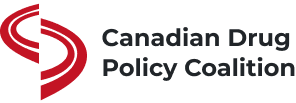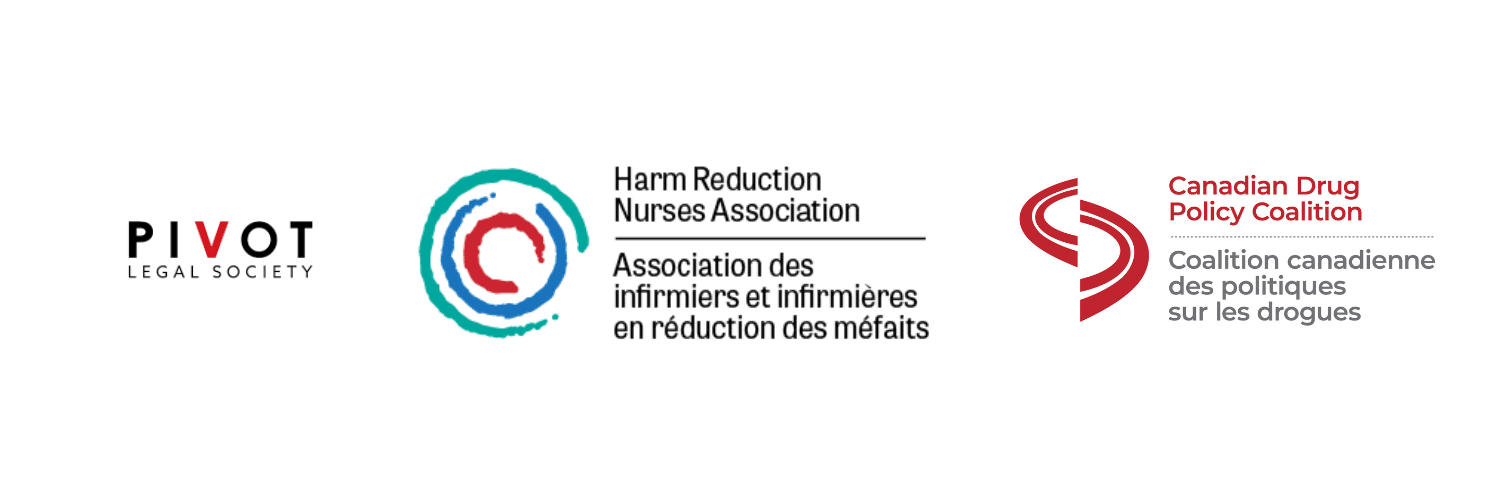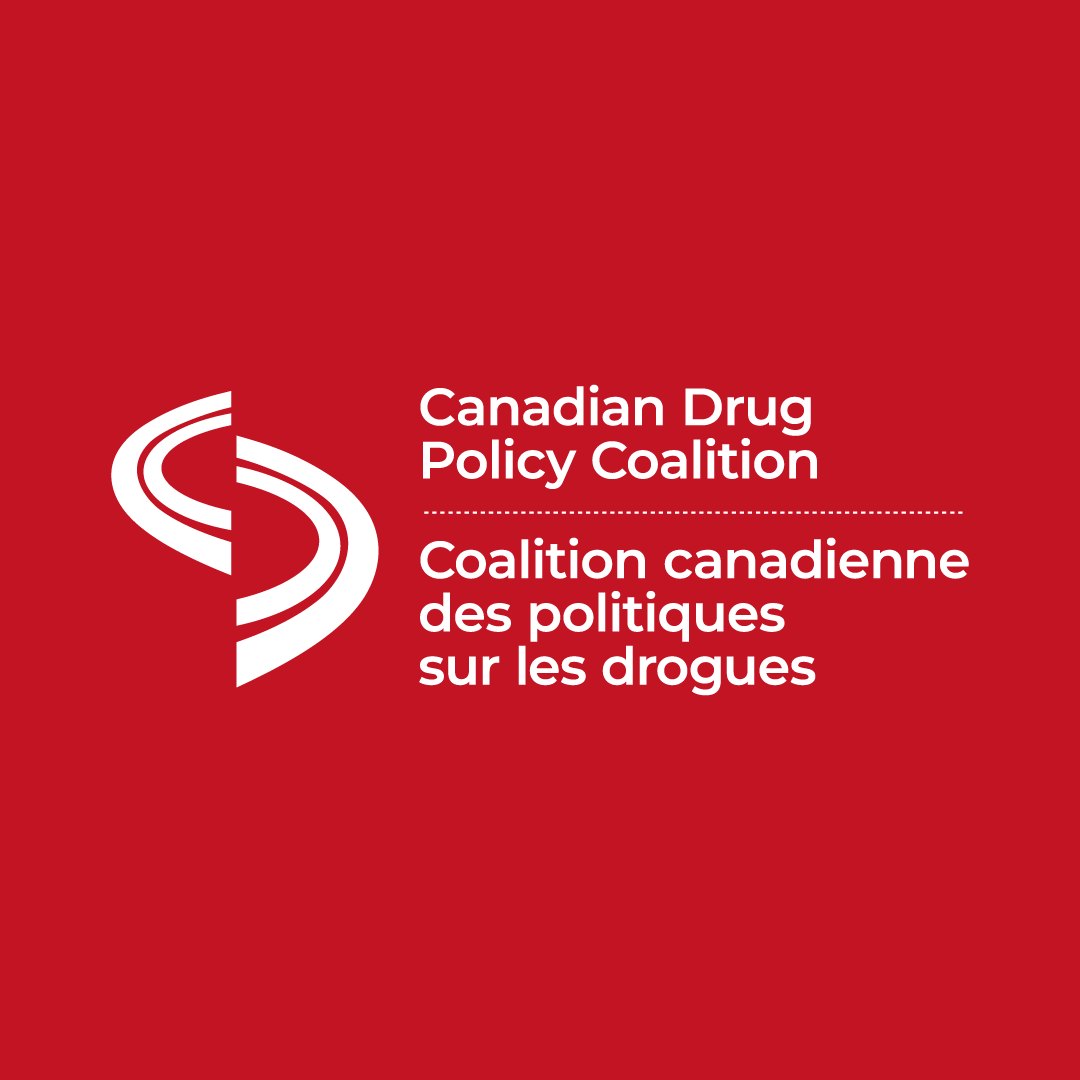Le français suit
The Canadian Drug Policy Coalition, Toronto Harm Reduction Alliance, Toronto Overdose Prevention Society, and Waterloo Region Drug Action Team (together, the “Intervenor Coalition”) are intervening before the Superior Court of Justice in Ontario to advocate for a path forward that is grounded in public health principles, upholds Charter rights, and protects against the perpetuation of stigma about people who use drugs as not worthy of the care needed for their survival.
The Intervenor Coalition will ask the Superior Court to use a public health framework with four key principles in its analysis. This guidance will assist the court to identify stigma against people who use drugs in both the legislation and evidence before the court and ensure stigma and prejudice are not reinforced in the court’s assessment of the claim.
The first principle in the public health framework is harm prevention, which is a fundamental aspect of public health policy and reflected in the stated purpose of Ontario’s Health Protection and Promotion Act. The prevention of harm must be prioritized, particularly when not doing so would result in death. Previous case law has affirmed that even one potential death is enough to establish that harmful effects resulting from a law are severe in relation to that law’s purpose.
The second principle addresses clarity and certainty, which are required from the state’s actions and the legislative environment to uphold public health objectives. The Act’s geographic restrictions on supervised consumption sites are both immediate and future-facing. This means that if a childcare centre or school were to be established within 200 metres of a site, or if another type of premise within 200 metres was prescribed under the Act as a designated premise, the site would be required to shut down. In this environment of uncertainty, site operators cannot be confident in the operational viability of a site. This runs counter to a public health framework, impacts services everywhere, and must be considered in the court’s assessment of the law.
The third principle requires that policy be grounded in evidence, not stigma. Legislation and decision-making are impacted by widely entrenched stigma against people who use drugs, requiring more careful consideration when assessing whether a law is discriminatory. It is essential to rely upon evidence rather than feelings of fear or discomfort, however common or previously uninterrogated, when drafting and assessing laws. Ontario’s submissions appear to contain instances of stigma not supported by evidence, for instance, conflating visible poverty or drug use with safety risks to the public, suggesting a causal relationship between supervised consumption sites and neighbourhood poverty levels where none exists, or failing to recognize how supervised consumption sites can support abstinence-based recovery.
The fourth principle in the public health framework is the need for alignment between public health and public safety goals. Public safety laws must not undermine public health goals. If the law increases public health risks, it fails to create conditions of safety for the benefit of entire communities and cannot be justified as an appropriate public health measure.
A public health approach to legislation is essential to chart a path out of a years-long national public health crisis that has claimed the lives and impacted the wellness of hundreds of thousands of people across the country. The Intervenor Coalition hopes that their contributions will support the courts in recognizing the benefits of public-health-first measures, and the importance of grounding legislation in evidence. Such recognition is especially important given the recent push by some politicians for a return to a criminal-law-centric approach to drug use, even absent any discernable benefits to this approach from either a public health or public safety perspective.1
1 See e.g. Health Canada’s Expert Task Force on Substance Use. Report 1: Recommendations on alternatives to criminal penalties for simple possession of controlled substances, Health Canada. 2021 May 6 and Report 2: Recommendations on the federal government’s drug policy as articulated in a draft Canadian Drugs and Substances Strategy (CDSS). Health Canada. 2021 Jun 6; Cano M, Timmons P, Hooten M, Sweeney K, Oh S. A scoping review of law enforcement drug seizures and overdose mortality in the United States. Int J Drug Policy.
___________________________________________________________
Faire valoir une perspective de santé publique à la Cour supérieure de justice de l’Ontario quant à la restriction des services de consommation supervisée
La Coalition canadienne des politiques sur les drogues (CCPD), la Toronto Harm Reduction Alliance, la Toronto Overdose Prevention Society et la Waterloo Region Drug Action Team (collectivement la « coalition d’intervenants ») ont introduit un recours devant la Cour supérieure de justice de l’Ontario pour faire valoir un cadre à suivre fondé sur les principes de la santé publique, qui assure le respect des droits garantis par la Charte et qui protège les personnes qui consomment des drogues de la perpétuation des préjugés selon lesquels elles ne méritent pas les soins nécessaires à leur survie.
La coalition d’intervenants demandera à la Cour d’adopter pour son analyse un cadre de santé publique basé sur quatre principes clés. Cette orientation permettra de faire ressortir les préjugés véhiculés sur les personnes qui consomment des drogues, tant dans les lois que dans les faits présentés à la Cour, pour que celle-ci veille à éviter de les renforcer dans son analyse du dossier.
Le premier principe du cadre est celui de la prévention, aspect fondamental des politiques en matière de santé publique qui est par ailleurs mentionné dans l’objectif de la Loi sur la protection et la promotion de la santé de l’Ontario. La prévention doit être une priorité, en particulier lorsque le non-respect de ce principe risque d’entraîner la mort. La jurisprudence antérieure a établi que même un seul décès potentiel suffit à établir que les effets préjudiciables d’une loi sont graves au regard de l’objectif de la loi.
Le deuxième principe porte sur la clarté et la certitude exigées des actes de l’État et du cadre législatif pour l’atteinte des objectifs de santé publique. Les restrictions géographiques imposées aux sites de consommation supervisée dans la Loi s’appliquent à la fois dans l’immédiat et dans l’avenir. Autrement dit, si un centre de garde ou une école ouvre à moins de 200 mètres d’un site ou si un autre type d’établissement se trouvant dans ce rayon devient un « lieu prescrit » en vertu de la Loi, le site sera dans l’obligation de fermer. Cette incertitude empêche les gestionnaires de sites de consommation supervisée d’évaluer avec confiance la viabilité de leurs projets. Cette disposition va à l’encontre du cadre de santé publique, elle touche tous les services, où qu’ils se trouvent, et doit être prise en compte dans l’analyse de la Loi par la Cour.
Le troisième principe veut que les politiques se fondent sur les faits plutôt que sur des préjugés. Les lois et les décisions juridiques sont influencées par des préjugés profondément enracinés à l’endroit des personnes qui consomment des drogues, ce qui appelle un examen particulièrement rigoureux pour statuer sur le caractère discriminatoire ou non d’une loi. Il est essentiel de se fier, lors de l’élaboration ou de l’examen de textes législatifs, à des éléments factuels plutôt qu’à des sentiments de peur ou d’inconfort, même si ceux-ci sont très répandus ou n’ont jamais auparavant été remis en question. Les textes proposés par l’Ontario semblent contenir des traces de préjugés qui ne sont pas corroborés par les faits, nommément l’amalgame entre pauvreté apparente ou consommation de drogues et risques pour la sécurité de la population, la supposition d’une relation de cause à effet entre la présence de sites de consommation supervisée et le niveau de pauvreté d’un quartier, bien qu’aucun lien du genre n’ait été prouvé, ou encore la non-reconnaissance du rôle que peuvent jouer les sites de consommation supervisée dans le rétablissement fondé sur l’abstinence.
Le quatrième principe est celui de l’harmonisation nécessaire entre les objectifs de santé publique et de sécurité publique. En effet, les lois traitant de la sécurité publique ne doivent pas compromettre les objectifs de santé publique. Une loi ayant pour effet d’accroître les risques de santé publique ne met pas en place les conditions nécessaires à la sécurité de toute la population et n’est donc pas justifiée comme mesure de santé publique adéquate.
Il est essentiel d’adopter une approche législative tenant compte de la santé publique afin de tracer une voie susceptible de nous sortir de la crise de santé publique nationale qui dure depuis plusieurs années et qui a volé la vie ou miné le bien-être de centaines de milliers de personnes à l’échelle du pays. La coalition d’intervenants espère que son apport aidera les tribunaux à reconnaître les bienfaits des mesures mettant la santé publique au premier plan et l’importance de fonder les lois sur des faits. Cette reconnaissance est particulièrement importante dans le contexte où des membres de la classe politique ont récemment encouragé un retour à une approche pénale en matière de consommation de drogues, malgré l’absence de tout bienfait observable de cette approche, que ce soit du point de vue de la santé publique ou de la sécurité publique1.
1 Voir par exemple les travaux du Groupe d’experts sur la consommation de substances de Santé Canada :Rapport 1 : Recommandations de solutions de rechange aux sanctions pénales pour possession simple de substances contrôlées (Santé Canada, 6 mai 2021) et Rapport 2 : Recommandations relatives à la politique du gouvernement du Canada en matière de drogues, telle qu’elle est énoncée dans le projet de Stratégie canadienne sur les drogues et autres substances (SCDAS) (Santé Canada, 6 juin 2021); Cano, M., Timmons P., Hooten, M., Sweeney, K. et Oh, S. A scoping review of law enforcement drug seizures and overdose mortality in the United States. International Journal on Drug Policy.











